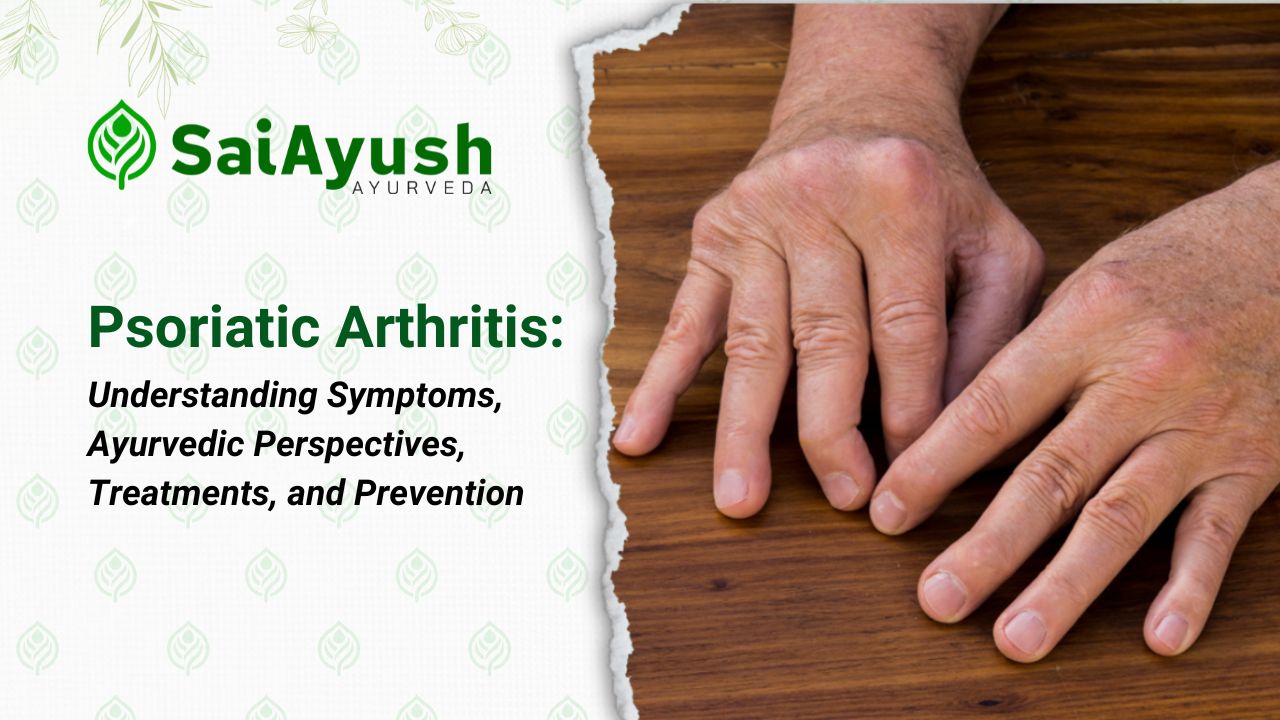Introduction
Living with psoriatic arthritis can be challenging, but understanding its symptoms and exploring holistic treatments can make a significant difference. In this post, I’ll delve into the signs and symptoms of psoriatic arthritis, explore the Ayurvedic perspective, and discuss both internal and external Ayurvedic treatments. I’ll also cover preventive measures to help manage and alleviate this condition.
What is Psoriatic Arthritis?
Psoriatic arthritis is a chronic autoimmune disease that combines the skin condition psoriasis with arthritis. This inflammatory disease can lead to joint pain, swelling, and stiffness. Unlike other forms of arthritis, psoriasis arthritis is unique because it is associated with skin and nail psoriasis, adding another layer of complexity to its management.
What are the Signs and Symptoms of Psoriatic Arthritis?
Psoriatic arthritis can manifest in various ways, making it essential to recognize its signs early on:
- Joint Pain and Stiffness: Often affecting fingers, toes, knees, and the lower back.
- Swollen Fingers and Toes: Sausage-like swelling, known as dactylitis.
- Foot Pain: Particularly at the back of your heel (Achilles tendinitis) or in the sole of your foot.
- Lower Back Pain: Inflammation in the joints between your spine and pelvis.
- Nail Changes: Pitting, discoloration, or separation from the nail bed.
- Skin Symptoms: Psoriasis plaques on the skin.
Ayurvedic Perspective on Psoriatic Arthritis
Ayurveda, an ancient system of medicine, offers a holistic approach to understanding and treating psoriatic arthritis. According to Ayurveda, PsA is a result of imbalances in the body’s doshas: Vata, Pitta, and Kapha. Specifically, it is often seen as an imbalance in Vata and Kapha, leading to the accumulation of toxins (ama) in the joints.
Ayurvedic Treatments for Psoriatic Arthritis
Internal Treatments
- Herbal Remedies:
- Turmeric (Curcuma longa): Known for its anti-inflammatory properties.
- Ashwagandha (Withania somnifera): Helps reduce stress and inflammation.
- Guggulu (Commiphora mukul): Effective in detoxifying and reducing joint pain.
- Dietary Changes:
- Anti-inflammatory Diet: Emphasizing fruits, vegetables, whole grains, and lean proteins.
- Avoiding Trigger Foods: Such as red meat, dairy, and processed foods that can exacerbate inflammation.
- Panchakarma Therapy:
- Detoxification Processes: Such as Vamana (therapeutic vomiting), Virechana (purgation), and Basti (medicated enema) to remove ama (toxins) from the body.
External Treatments
- Abhyanga (Oil Massage):
- Using medicated oils like Mahanarayan oil to soothe joint inflammation and stiffness.
- Svedana (Sudation Therapy):
- Steam therapy to promote sweating and detoxification.
- Lepam (Medicated Paste):
- Application of herbal pastes on affected areas to reduce pain and inflammation.
Preventive Measures for Psoriatic Arthritis
- Regular Exercise: Low-impact activities like swimming and yoga to maintain joint flexibility and muscle strength.
- Healthy Diet: Consuming anti-inflammatory foods and staying hydrated.
- Stress Management: Practices like meditation, deep breathing exercises, and adequate sleep.
- Skin Care: Regular moisturizing and avoiding skin injuries to manage psoriasis symptoms.
- Routine Medical Check-ups: Regular visits to healthcare providers for monitoring and managing the condition.
FAQs
Q: What are the early signs of psoriatic arthritis?
A: Early signs include joint pain, stiffness, swelling, and noticeable changes in the nails and skin associated with psoriasis.
Q: How does Ayurveda view psoriatic arthritis?
A: Ayurveda sees psoriatic arthritis as an imbalance in the doshas, primarily Vata and Kapha, leading to the accumulation of toxins in the joints.
Q: What are some effective Ayurvedic treatments for psoriatic arthritis?
A: Effective treatments include herbal remedies, dietary changes, Panchakarma therapy, oil massages, steam therapy, and medicated pastes.
Q: Can lifestyle changes help in managing psoriatic arthritis?
A: Yes, regular exercise, a healthy diet, stress management, proper skin care, and routine medical check-ups can significantly help manage the condition.
Q: Are there preventive measures for psoriatic arthritis?
A: Preventive measures include maintaining a healthy lifestyle, managing stress, and regular monitoring of the condition to catch and treat symptoms early.
Conclusion
Living with psoriatic arthritis doesn’t have to be a constant struggle. By understanding its signs and symptoms, exploring the benefits of Ayurvedic treatments, and implementing preventive measures, it’s possible to manage and even alleviate the discomfort associated with this condition. Stay proactive, take care of your health, and explore holistic approaches for a better quality of life.
Discover the healing power of Ayurveda with our latest article at Sai Ayush Ayurveda Hospitals! Dive into the age-old wisdom that can rejuvenate your body and mind. Click here to read more:



0 Comments